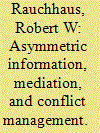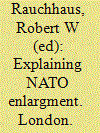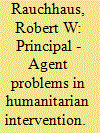| Srl | Item |
| 1 |
ID:
074557


|
|
|
|
|
| Publication |
2006.
|
| Summary/Abstract |
This article examines mediation in conflicts using both a game-theoretic model and a quantitative analysis. The game-theoretic model suggests that mediator effectiveness rests primarily on the ability of third parties to provide critical information about the disputants' reservation points. The empirical analysis finds that mediation that targets asymmetric information is a highly effective form of conflict management. Moreover, the results suggest that mediation outperforms other forms of third-party intervention, including those that entail coercion. Both the model and quantitative analysis indicate that impartial mediators will generally outperform biased ones. Along with providing new information on conflict management, the quantitative analysis also has broader implications for IR theory. The results provide empirical support for the rationalist claim that asymmetric information is one of the root causes of war.
|
|
|
|
|
|
|
|
|
|
|
|
|
|
|
|
| 2 |
ID:
047184


|
|
|
|
|
| Publication |
London, Frank Cass, 2001.
|
| Description |
vii, 219p.
|
| Standard Number |
0714651273
|
|
|
|
|
|
|
|
|
|
|
|
Copies: C:1/I:0,R:0,Q:0
Circulation
| Accession# | Call# | Current Location | Status | Policy | Location |
| 044962 | 355.031/RAU 044962 | Main | On Shelf | General | |
|
|
|
|
| 3 |
ID:
092332


|
|
|
|
|
| Publication |
2009.
|
| Summary/Abstract |
A number of recent studies have concluded that humanitarian intervention can produce unintended consequences that reduce or completely undermine conflict management efforts. Some analysts have argued that the incentive structure produced by third parties is a form of moral hazard. This paper evaluates the utility of moral hazard theory and a second type of principal-agent problem known as adverse selection. Whereas moral hazards occur when an insured party has an opportunity to take hidden action once a contract is in effect, adverse selection is the result of asymmetric information prior to entering into a contract. Failing to distinguish between these two types of principal-agent problems may lead to policy advice that is irrelevant or potentially harmful. Along with introducing the concept of adverse selection to the debate on humanitarian intervention, this study identifies a commitment dilemma that explains why third parties operating in weakly institutionalized environments may be unable to punish groups that take advantage of intervention.
|
|
|
|
|
|
|
|
|
|
|
|
|
|
|
|